With the October weather the past couple of days at a balmy 18C, the news this week that we are close to irreversible climate breakdown and the UN saying there is no credible pathway in place to limit global heating to 1.5C and that global emissions must fall by almost 50% by that date to keep the 1.5C target alive, on top of a report by the WWF a couple of weeks ago which said that humans have caused Earth’s wildlife populations to decline by an average of 69% in just under 50 years…
…all whilst our leaders and politicians seem to be doing nothing…
…well, it’s probably not surprising that I can feel myself slipping back down and getting stuck in the trough of acceptance/depression on the “stages in the roller coaster of change” chart, as shared by Jacqueline Hill in Wicked Leeks a few weeks ago.
I know this kind of thing isn’t linear so I am simply observing how I’m feeling right now, not judging myself and giving myself grace. Things can feel hopeless and exhausting. The news is shit. Our politicians are not stepping up to the mark. But I also know that there are actions that can be taken, decisions to be made, changes that can be put into motion. How are you faring and whereabouts are you?
And whilst we’re checking in, where do you find yourself on this “How am I fighting the climate crisis” graphic as created by @sophei and The Slow Factory? Perhaps there’s learning and growth to be made here that might see us moving in a positive direction…
You might find this video by @lovely_._lydia useful too, if you’ve not seen it before on: how we can create political change.
Meanwhile, if you’re feeling a little stuck, here are some thoughts and ideas on how we might make a difference in our own backyard (in no particular order and written off the top of my head):
Propagate your own plants - divide, take cuttings, sow seed
Garden for soil health: Compost. Consider no dig
Grow plants for wildlife, biodiversity, pollinators and for food
Think about planting more perennials, shrubs and trees, that require less resources once established and which remain year after year
Garden organically. In most cases there is no need for those of us tending our back gardens to using pesticides, weed killers and insecticides
Garden in community for community
Slow down, resist, rest - why/what/who am I gardening for? Do I need to buy the thing I’m thinking of buying? What are the hidden costs/waste/environmental harm?
Right plant, right place - which will mean less resources are needed for the plant to survive/thrive
Think twice about the seeds, plants and flowers I’m buying - how have they been raised and cultivated? Waste? Chemicals? Peat? What is its role and ecological value in my garden?
Loosen the grip of control and perfectionism, performance, appearances. Be less tidy and controlling. Let go of indoctrinated ideas of tidiness and perfectionism as if this somehow makes us a “good” person. To borrow the term from Rebecca Hoskins, what might a more “complex” garden or landscape bring instead?
Leave the lawn to grow where you can
Speak up with friends and family about the ways in which you’re gardening with climate, biodiversity, environment in mind
Demand more from our politicians and people in positions of power and influence
Vote for parties who take the issues of climate crisis, biodiversity loss and environmental destruction and necessary action seriously
Change your bank account to one that uses your money ethically (divest from fossil fuels)
Organise and collaborate - connect and join up with local groups working towards climate, environmental, racial and social justice. Not only because meaningful change has to be collective and cannot happen alone in isolation, but also because we all need support and to share in joy too.
If you are a paid subscriber you can add any thoughts or ideas to this list in the comments below.





